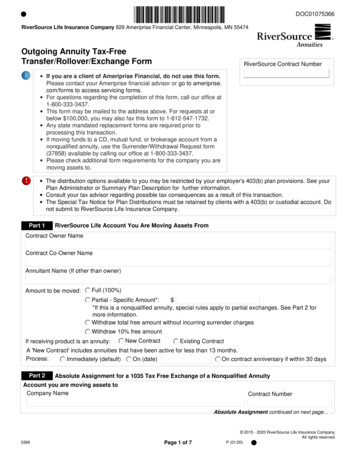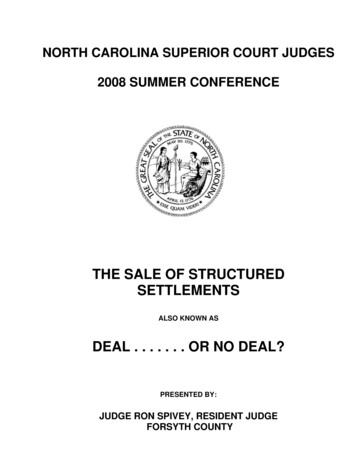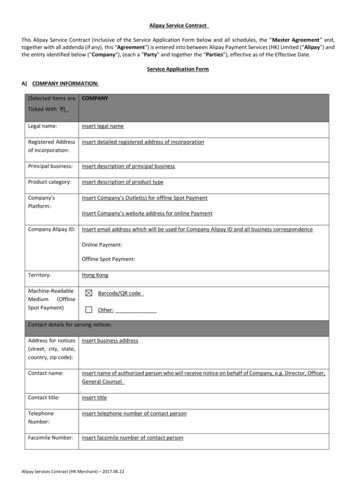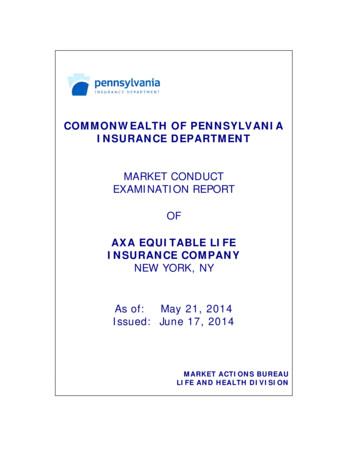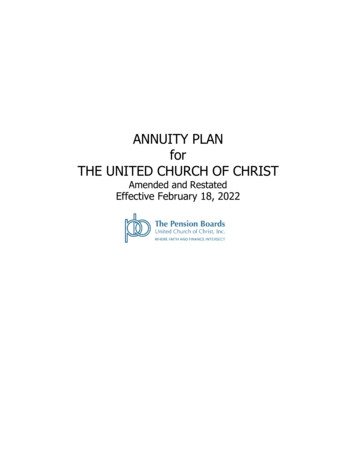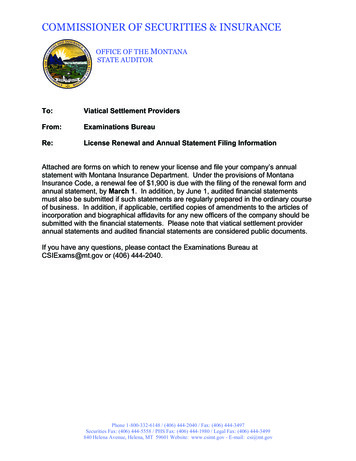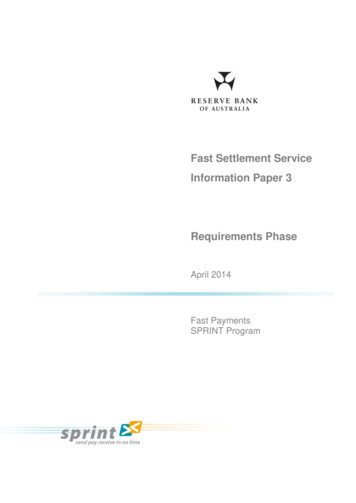
Transcription
A Structured Settlement Annuity Almost Always Saves MoneyWhen Funding a Medicare Set-Aside by Cindy L. ChanleySince the late 1990s, attorneysand claims handlers have takencaution when settling workers’compensation claims that involvesomeone who is either a Medicarebeneficiary, or will become a beneficiaryin the foreseeable future. A MedicareSet-Aside (MSA) allocation is a toolone can use to prevent the burden offuture medical care from being shiftedto Medicare. Given the issues an MSApresents, more claims professionals andattorneys are looking at a structuredsettlement as a way to fully fund anMSA and avoid potential problems forthe parties post settlement.14What is an MSA?Medicare Set-Aside Arrangement(MSA) for workers’ compensationpurposes (WCMSA) as a “financialagreement that allocates a portion ofa workers’ compensation settlementto pay for future medical servicesrelated to the workers’ compensationinjury, illness, or disease” (cms.gov). Although not required by TheMedicare Secondary Payer Act, 42U.S.C. §1395y(b)(2), and federalregulations 42 C.F.R. §411.20 et. seq.,most employers and insurers use anMSA as a tool to determine and fundfuture medical expenses otherwisereimbursable by Medicare for aworkers’ compensation settlement.The Centers for Medicare andMedicaid Services (CMS) defines aCMS has published guidelines fordetermining an appropriate MSADecember 2014 The Self-Insureramount for workers compensationcases. An MSA can be prepared by theemployer or its insurer, an attorney,or by a company that specializesin providing this service. A typicalMSA report includes a projectionof future Medicare related medicaland prescriptions determined by acomprehensive review of medical andprescription records and paymenthistories, physician recommendationsand standard of care. The medicalprojection will be based on a workers’compensation fee schedule or“usual and customary”, dependingon the state of jurisdiction. Theprescription drugs are priced basedon Redbook Average WholesalePrice (AWP). Many insurers have Self-Insurers’ Publishing Corp. All rights reserved.
established procedures and/or approved vendors for developing MSA reportsand submissions to CMS, in addition to specific claim handling procedures andrequired language for settlement agreements when resolving claims involvingfuture medicals to ensure Medicare’s interests are protected.How is an MSA Funded?The Centers for Medicare and Medicaid Services (CMS) guidelines allowparties some latitude when funding an MSA. Under current CMS guidelines, anMSA can be funded in one of two ways: Lump Sum for the entire MSA amount; or Structured Settlement Annuity (includes cash and an annuity) to pay theMSA over the injured party’s life expectancyFunding an MSA with a structured settlement annuity almost always savesmoney over the lump sum option. Research suggests that structured settlementfunding of MSAs saves an average of 37% as opposed to cash funding.CMS Guidelines When Funding with an AnnuityCMS guidelines require that when a structured settlement annuity is used, theMSA be funded as follows: Seed – an initial deposit, or lump sum, to cover two years’ worth of medicaland prescription payments, a first surgery, procedure, or replacement. Annuity – MSA less the seed amount is distributed evenly, payable annually,over the injured party’s life expectancy through the purchase of a structuredsettlement annuity contractDetailed information regarding these guidelines is spelled out in the Workers’Compensation Medicare Set-aside Reference Guide, which is accessible on theCMS website.An important note: CMS must be notified of the employer/insurer’s intention tofund the MSA with an annuity during the submission process.Types of Annuities to consider when funding an MSAThe combination of cash and an annuity to fund an MSA almost always savesmoney over funding it as a lump sum. There are a number of different types ofannuities an employer or its insurer can purchase to meet CMS requirements inspreading out the annuity over an injured party’s life expectancy, or lifetime. A Temporary Life Annuity provides an annual MSA payment for the injuredparty’s life expectancy, only if the injured party is living. This is usually theleast expensive annuity used in funding an MSA annual payment. Thedisadvantage of this type of annuity is that the payments stop at the deathof the injured party and there is no residual value or payment that canpass to an injured party’s beneficiary or as a refund to the employer or itsinsurer. For example, if an employer pays 100,000 to provide 1,000/yearfor 30 years and the injured party dies after one year, the employer has paid 100,000 for a 1,000 payment. This type of annuity is attractive for smallMSA amounts. A Life Only Annuity will provide an annual MSA payment for the injuredparty’s lifetime. All payments cease on the death of the injured party/ Self-Insurers’ Publishing Corp. All rights reserved.annuitant. This annuity is usuallyslightly more expensive than aTemporary Life Annuity. As witha Temporary Life Annuity, allpayments cease on the deathof the injured party. There is noopportunity for recovery of anyfunds by the employer or thepossibility of the injured party’sbeneficiary receiving anything onthe death of the injured party. A Life with Cash Refund Annuitywill provide an annual paymentfor the life of the injured party,but provides a refund of theunused portion of the annuitypremium in the event of thedeath of the injured party. Forexample, if the employer spends 100,000 for the annuity and theinjured party dies after 50,000of payments have been paid out,the injured party’s beneficiary orthe employer will receive 50,000on the injured party’s death. A Period Certain Annuity willprovide an annual paymentfor the injured party’s lifeexpectancy, whether or notthe injured party is living. Thispayment is guaranteed to bepaid to the injured party’sbeneficiary or the employeron the injured party’s death.On death, the paymentswill continue to be paidto the beneficiary (injuredparty’s family member or theemployer’s insurer). As analternative, many life insurancecompanies that offer structuredsettlement annuities providea commutation product thatallows the beneficiary or theemployer to receive a lumpsum of the commuted valueof any remaining paymentson the death of the injuredparty/annuitant.The Self-Insurer December 201415
Pros and Consof Annuity TypesThere are advantages anddisadvantages to each of the annuitytypes used to fund the MSA annualpayments or to fund the annual feeto pay for professional administrativeservices for the MSA. It is important todiscuss these options with a structuredsettlement consultant to ensurethe injured party and/or employer’sinterests are handled appropriately.is knowledgeable about the issues relating to the current liability and/or workers’compensation issues relating to Medicare Set-Aside Allocations. A knowledgeablestructured settlement consultant is a valuable asset to all the parties, from thenegotiation stage to CMS approval.Using annuities to fund anMSA annual payment and/or MSAprofessional administrative feesprovides advantages to the injuredparty and the employer.From the injured party’sperspective, whether or not theinjured party is a Medicare beneficiary,settlement dollars provided forMedicare related medical expensesare restricted and must be usedexclusively for that purpose. With alump-sum MSA, a Medicare beneficiarymust spend the entire amount ofthe MSA before Medicare will coverMedicare expenses relating to thework injury. With the annuity option,Medicare will cover any expenses overand above the injured party’s currentMSA balance each year.16Administration of an MSA Funded By an AnnuityAn MSA funded via an annuity can be administered either by a third partyor by the injured party. It is important to note that regardless of how it isadministered, the injured party is ultimately responsible to ensure MSA funds areproperly paid from the account to cover Medicare reimbursable services and arerelated to the injury.If the MSA is funded with an annuity, it is essential to be aware of the CMSguidelines related to the account, whether it is self-administered by the injuredparty or professionally administered by a third party. The MSA administrator must be competent to administer the account.From the employer’s perspective,the annuity option is almost ALWAYSless expensive than paying the MSA ina lump sum, providing the possibilityfor saving claims dollars and/orhaving an opportunity to have extradollars for negotiation purposes. Inaddition, the employer or its insurercan negotiate the settlement toreceive the possibility of a refund orthe commuted value of remainingpayments, in the event the injuredparty dies before the end of theinjured party’s life expectancy. The MSA should be established within thirty (30) days of the disbursalof settlement funds. Information regarding the establishment of the MSAshould be sent to CMS if the MSA has been reviewed and approved.The parties should involve astructured settlement consultant that The administrator must maintain accurate records of the distributions andexpenditures from the MSA account.December 2014 The Self-Insurer The MSA administrator must also deposit the total sum of the MSAfunds into an interest bearing account for which the injured party is thesole beneficiary. This would include all funds from the seed money andsubsequent feed money funds. All funds from the MSA should be properly exhausted before Medicareresumes payment of medical expenses related to the medical claimscovered under the settlement. In cases of an annuity, this may resultin periodic depletion and notice to CMS. It is also required that theadministrator notify CMS when annuity money is deposited into theaccount. At that point, the MSA should resume payment for reimbursablemedical care and treatment. Self-Insurers’ Publishing Corp. All rights reserved.
ING U.S. is transitioning to Voya FinancialTM throughout 2014We can’t stopmisfortune.We canstop loss.Becoming a top tier Stop Loss carrier doesn’t just happen.For 35 years, our dedication to creative solutions has madeus the top choice for our clients.Not all Stop Loss carriers are created equal. Today’s businesses have unique needs that demand expert-levelservice. That’s been the foundation of our Stop Loss offering from the beginning. We know it’s not just the plan;it’s the team behind it.Your business is unlike any other. It’s time for a Stop Loss carrier that’s unlike any other, too. Our mission as VoyaFinancial is to make a secure financial future possible for employers and employees nationwide.For information on Stop Loss, contact your local Voya Employee Benefitssales representative or call 866-566-2316.For information about Voya, visit voya.com.RETIREMENT I INVESTMENTS I INSURANCEStop Loss insurance products are underwritten by ReliaStar Life Insurance Company (Minneapolis, MN) and ReliaStar Life Insurance Company of New York(Woodbury, NY). Within the state of New York, only ReliaStar Life Insurance Company of New York is admitted, and its products issued. Both are members of the Voyafamily of companies. Product availability and specific provisions may vary by state. 2014 ING North America Insurance Corporation. LG11566 03/28/2014 169553 Self-Insurers’ Publishing Corp. All rights reserved.The Self-Insurer December 201417
2013 Helmsman Management Services LLC.WE CAN HELP YOU LOWERYOUR COSTS,EVEN FOR YOUR MOSTCOMPLEX CLAIMS.Thankfully, catastrophic and complex claims don’t happenoften. But when they do, they can result in significantlosses for your business and significant injury to yourvalued employees. A compassionate claim professionalwith the right resources and experience can make all thedifference in bringing about a positive outcome for youand your injured worker. To learn more, ask your brokeror visit helmsmantpa.com.18December 2014 The Self-Insurer Self-Insurers’ Publishing Corp. All rights reserved.
The only allowable “non-medical” expenses that are reimbursable fromthe MSA are for associated taxes, banking fees, mailing fees or documentcopying charges related to the MSA. The funds in the MSA may not be usedto pay premiums for Medicare supplemental insurance (e.g. – “Medigap”) forthe beneficiary. The administrator must make every effort to obtain and pay for medicalcare and treatment for their injuries covered herein from medical providersthat will accept payment pursuant to the funding methodology used in thedevelopment of the MSA (Workers’ Compensation Medical Fee Scheduleor “usual and customary”). If a provider, physician or other supplier refuses to accept payment underthe applicable funding methodology or a claim is denied, he/she agreesto consult the Medicare Regional Office in order to determine whetherMedicare should pay the claim. If a determination to deny the claim is madeby the Medicare Regional Office, then Medicare’s regular administrativeappeals process for claim denials would apply to the claim. The administrator of the MSA is required to submit an annual accountingto CMS. This accounting is required to take place and be submitted withinthirty (30) days after the close of the annual accounting period, which is theanniversary of the funding of the MSA. A final accounting is required to takeplace within sixty (60) days of the MSA funds being completely depleted.These accountings shall include, but not be limited to, the retention ofreceipts for medical care and treatment received and paid with funds fromthe MSA.Do you aspireto be a publishedauthor? Do you have anystories or opinions on the selfinsurance and alternative risktransfer industry that you wouldlike to share with your peers?We would like to invite you toshare your insight and submitan article to The Self-Insurer!SIIA’s official magazine isdistributed in a digital andprint format to reach overConclusions10,000 readers around theUsing an annuity with some cash is a cost effective way to fund anMSA or future medicals, whether or not the parties decide to seek a CMSrecommendation. A knowledgeable structured settlement consultant can provideproposals to fund the MSA by utilizing annuities that work best for the partiesduring the negotiations. Funding an MSA with an annuity almost always savesmoney over a lump sum option, saving significant claim dollars or freeing upmoney for settlement negotiations. As a result, claim best practices are beingdeveloped across the insurance, self-insurance and TPA marketplace. nworld. The Self-Insurer hasCindy L. Chanley, Certified Structured Settlement Consultant (CSSC), an associate withRingler Associates, managing its Louisville and southern Indiana offices. She can bereached at cchanley@ringlerassociates.combeen delivering information tothe self-insurance/alternativerisk transfer community since1984 to self-funded employers,TPAs, MGUs, reinsurers, stoploss carriers, PBMs and otherservice providers.Articles or guidelineinquiries can besubmitted to EditorGretchen Grote atggrote@sipconline.net.The Self-Insurer also hasadvertising opportunitiesavailable. Please contact ShaneByars at sbyars@sipconline.netfor advertising information. Self-Insurers’ Publishing Corp. All rights reserved.The Self-Insurer December 201419
Structured Settlement Annuity (includes cash and an annuity) to pay the MSA over the injured party's life expectancy Funding an MSA with a structured settlement annuity almost always saves money over the lump sum option. Research suggests that structured settlement funding of MSAs saves an average of 37% as opposed to cash funding.
